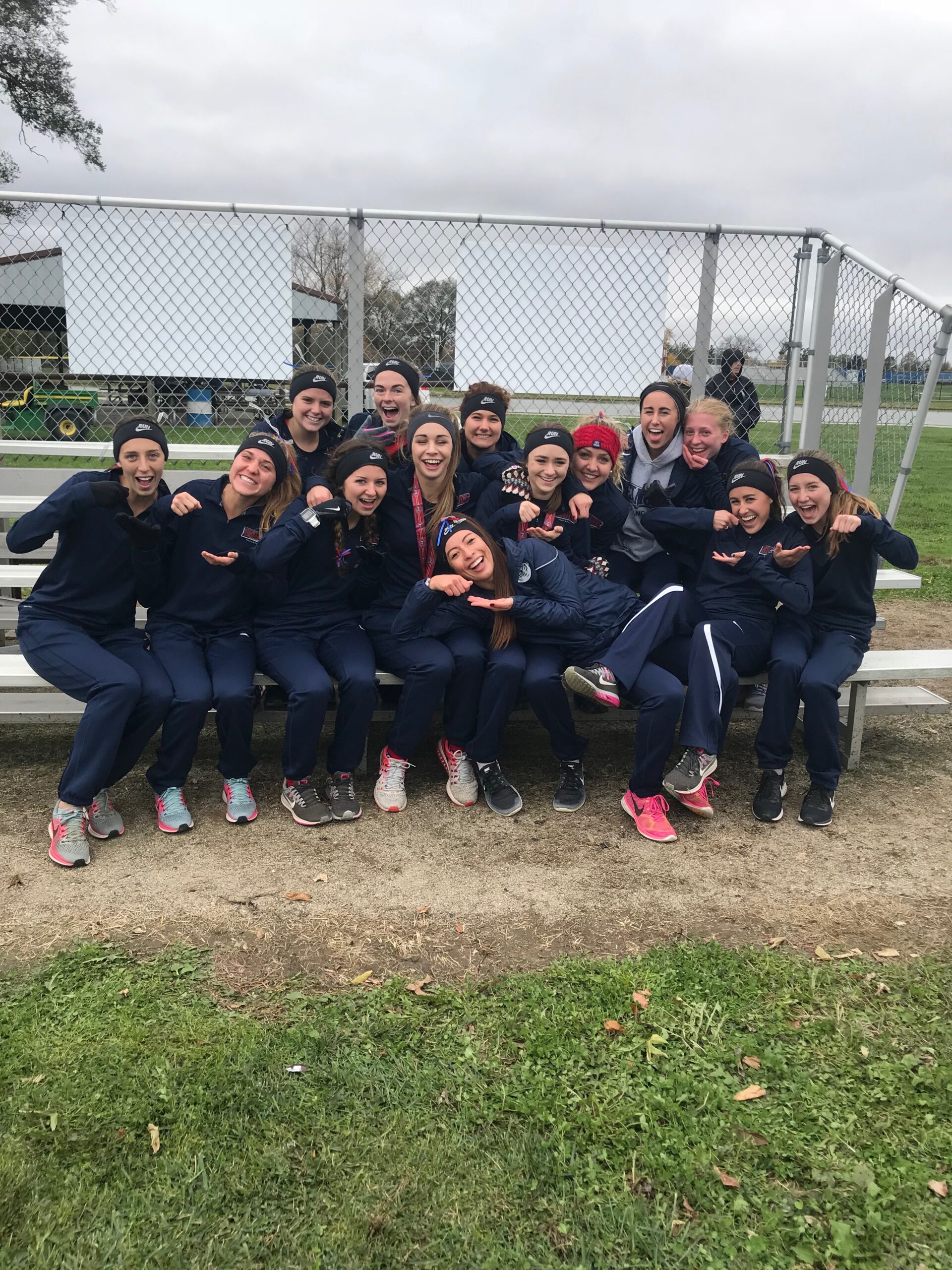5 Life Lessons that Running has Taught Me
By: Caroline Daniel

I started running competitively in the fifth grade. Truth be told, I hated it. I had the best mile time at my small, private middle school, however, so my parents encouraged me to give track a try. Eleven years have passed since then, and I am now a senior in college in the midst of my final year of competitive cross country and track. Since my junior outdoor track season (and now my senior cross country season) was cancelled this past spring due to COVID, I have had a lot of time to reflect on my time as a competitive runner. During that period of time, I’ve realized that this sport has taught as much about myself and about life as I have learned in the classroom. Although I’m only 22, I hope that you can take something from the running-related wisdom I’ve gained throughout the past decade.
Lesson #1: Habits are hard to form and easy to break.
A lot of people hate running. A lot fewer love it. And most assume that because I’m a division 1 athlete, I love running–100% of the time. But I’m here to tell you that that is 100% not true.
As a college distance runner, my year is divided into four nearly equal “phases.” Cross country in the fall, indoor track in the winter, outdoor track in the spring, and mileage building in the summer. Unlike most college athletes, we distance runners don’t get an “off season.” The whole time we’re at school, we’re racing. And during the summer, the one season we’re not racing, we’re running more mileage in more difficult conditions than we face the entire rest of the year–so we’re still mentally and physically exhausted.
Because of this lack of an off-season, I live most of my year with my eye set on two coveted 10-day breaks–one in the middle of November and one in the middle of May.
Yes. That’s it. Twenty days of the year when I’m not dedicating my energy to my sport.
But despite getting up at 6:30 AM almost every day of the week for 6 month blocks at a time, during those 10 days, my body manages to break every good habit it has developed for almost half of the year. So much so that when I step out the door for my first post-break run, I usually feel unmotivated, sluggish, and like I haven’t run in a month. It’s like my body finally realizes how exhausted it is and decides it wants to hibernate.
It’s always four weeks. Take 10 days off, have four weeks of mostly ROUGH running. The type of running that makes you not want to get out the door–because why do you train for months at a time only to feel like you haven’t run in forever? But, about three months into your training cycle, you remember why. Suddenly, getting up at 6:30 and going for an 8 mile run feels effortless. The weather is crisp, your legs are fresh, and your lungs let you know that they’re ready to race. THAT is what you do it for. That’s the fun part.
It takes months to rebuild the habit. It only takes about a week to break it.
I say this because I hypothesize that most people who “don’t like running” simply haven’t tried it for long enough to get past the initial slump. And I’m here to tell you, as a competitive runner, that I experience the slump too–and I see you–it’s NOT fun. But I contend that the runner’s high after the slump makes the grind worth it. So keep working until you can form the habit.
Lesson #2: Confidence is equally as important as VO2max.
There are seemingly endless ways to test your fitness nowadays. But, in running, the simplest way to do that is simply to race. But your time on any given day could be far from an accurate display of your physical fitness.
My sophomore year of college I raced a mile during indoor track. I ran a 5:25. For those of you who don’t know, that is NOT very good by college standards. Only a year later, at the same point in the season with less training than the year before, I raced a 5:10. Fifteen seconds in the mile is a LOT–and I am convinced that that large improvement in just a year was not just physical.
Sophomore year, I had a lot of things going on in my life outside of running that were keeping my confidence from where I would have liked it to be. Junior year, however, my life was going quite swimmingly. While that might seem irrelevant to running, for me, there is a direct relationship between the state of my social life and the state of my running performance. I can train as hard as I possibly can, but if I don’t have my social ~swagger~ then I never race the way I want to.

A slew of good workouts or runs means very little if you are not confident you can translate that work into the race. Similarly, if you have a strong inner confidence, a slew of bad workouts or a bad week of training cannot impact your ability to pull it all together in race conditions.
While I am applying the concept of confidence directly to running performance, I assert that the same rings true in other athletic endeavors and areas of life (like work). If not backed by a strong, confident foundation, our skills cannot be fully utilized. So, as you train–whether in running, in lifting, or in your job–make sure that you take the time to check in with your mind as well as your body. Make time for the supplemental things that make you happy and confident.
For me, this often means making what might not be the textbook “healthy” decision. I’ve had some of my best workouts after eating a little “too much” ice cream the night before. I’ve also had some of my best workouts when I stayed out late jumping for hours at a concert then night before. Why? Because ice cream and concerts make me happy. When I’m happy, I’m motivated and confident. And when I’m motivated and confident, I perform to the best of my ability.
Lesson #3: Company increases lung capacity.

Most college distance runners will tell you that, although they’re not racing, summer training is the hardest season of the year. The weather’s hotter, the humidity is RAGING (here in the south), and, worst of all, you’re not with your team.
My coach frequently talks about the “team training effect.” It sounds questionable, but there’s really something quite mystical about training with a group. Simply following others’ footsteps makes you run faster, for longer. We are social beings at our core–and team running brings that innate desire out of us.
I think a lot of people struggle to keep up with running because running longer distances alone is, frankly, lonely–and the perfect playlist can only go so far. For six months, I was running almost completely alone due to COVID or with one other friend–and we STRUGGLED.
However, once I was finally able to return to campus, it literally felt like a weight had been lifted from my lungs. Getting up early in the mornings seemed so much easier. 7 mile runs hurt so much less. I was spurred on by conversation and spending time with my friends. And, after quarantine, that is a feeling I have learned to never take for granted.
Next time you feel like your training (or life in general) is hitting a plateau, try adding a friend. I think you’ll be amazed at the physical effect company can have on your performance.
Lesson #4: Want to feel your deepest emotions? Go into oxygen debt.
We live in a society that often makes us feel as if we should cast aside our emotions for the sake of productivity and false positivity. Often, we don’t realize how stifling this way of living is. But, after days, weeks, or even months of living like this, we start to become emotionally exhausted and our mental health starts to deteriorate.
Running often saves me from this. For real. A hard workout brings every emotion to the surface–whether you’re ready for it or not.
Running-induced oxygen debt literally decreases the amount of oxygen going to our brains because our muscles are demanding so much O2. As a result of this decreased supply of oxygen, our brains lose some of their ability to filter our emotions. You might have heard distance runners talk about how weird some of their thoughts and conversations are during long runs, or how they often feel like they’re under the influence after a hard workout. This is because, much like alcohol, oxygen debt strips us of our filters.

If we’re happy, this leads to that coveted “runner’s high” feeling. But if we’re having a rough or exhausting day, we might end up crying on the side of the road or picking a petty fight with one of our friends for two-stepping us during an easy run (I have been guilty of this many times).
In this way, running helps me realize when I need to do a mental health check–whether I want to or not. If I’m feeling extremely angry, or anxious, or sad during or after runs/workouts, I know that something in my life needs to be re-evaluated. Although it’s a bit more painful than talking to a therapist (and cannot replace this valuable tool), running can be its own form of therapy when used correctly. Running can help you perform an initial “check-in” that can let you know if you should further evaluate your emotional health.
Lesson #5: Stick around. You won’t regret it.
Sure, I love running. It’s been one of my greatest passions for years now. But that doesn’t take away from the fact that it is one of the cruelest sports out there. If you’re not careful, running can eat you alive. It can become your identity. A bad run can start determining your mood for the entire day.
Running is such a cruel game because it isn’t necessarily true that you “get out of it what you put into it.” In fact, at some of the times when I have been training my absolute hardest, I have had very poor performances in races. And that hurts and makes you question everything. It forces you to re-evaluate your “why.”
As I said earlier in this post, running has taught me more lessons about myself and my life than just about anything else. One of the most important of these lessons is the never-ending process of discovering and reconfiguring your “why.” Put in other terms, your “why” is simply the deep-seated reason why you are pursuing something despite any and all signs telling you to give it up. When your “why nots” start outweighing your “whys,” that’s when you should probably re-evaluate what you’re dedicating your time to.
I’ve almost quit competitive running multiple times. One of these times, I was training harder than I ever had but racing worse than I ever had. Another couple of times, I had the best seasons of my life ended by severe bone injuries. This past summer, it was the fact that a global pandemic had cancelled my spring track and fall cross country seasons right before my final year of competitive running, leaving me plenty of time alone to ask myself: why am I still putting myself through 50+ mile weeks?
In each of these situations, I came back to the same “why.” It’s the people I surround myself with. My team throughout my years of running has brought me insane laughter and comfort in some of my darkest moments. The bonds forged between competitive runners are simply unbreakable. When you push your body to its absolute limits with a group of people, something special happens. As I mentioned earlier, oxygen debt brings out your deepest (and sometimes darkest) feelings. And coping with those with a community is an unforgettable experience.
I know that I will never stop running (as long as my body will allow). But there was nothing forcing me to keep running competitively all of these years. Every time I thought about quitting because of my performance, I realized that I would feel so much regret if I ended my time on a team before I had to.
The sad thing is, in less than a year I will have to. But knowing that I’ve persevered and stuck around through every high and low will help me feel a little less sad (and maybe (maybe) a little less overly sentimental).

I’m not a competitive runner – should I care?
First of all, if you’ve read this far into my little spiel, thank you. But, to answer your question, you should care because these lessons I’ve taken from my 10+ years of competitive running are lessons that can be applied to any area of life. Running is my passion–but you can substitute whatever your passion is to help apply this to your life.
And if you’re not a runner, then I hope that this post helps you go for a 1 mile jog. And I hope that that 1 mile jog starts you down a path to falling in love with this unique sport. You might not believe it now, but running is addicting. And the runner’s high really is as great as they say.
